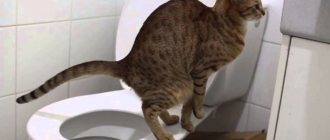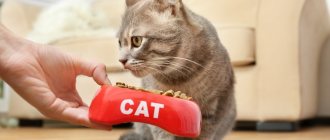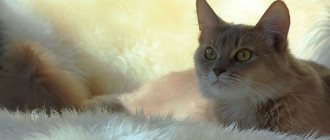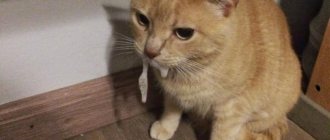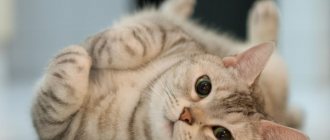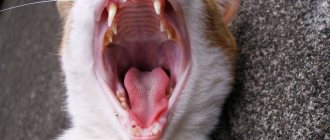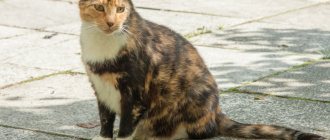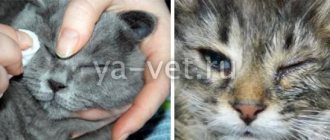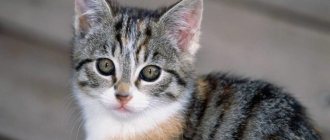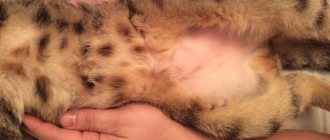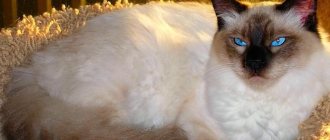Rapid breathing - normal variants
The normal breathing rate of a pet ranges from 20 to 40 breaths per minute. If a cat begins to breathe with greater intensity, this does not mean that he is necessarily ill. Often the reasons for such changes in breathing are:
- overexcitement, fear or rage;
- travel in any transport;
- being in an unfamiliar place;
- visiting a veterinary clinic and taking medications;
- physiological changes in the cat’s body (estrus, pregnancy, childbirth);
- active games, walks, exercise, etc.;
- the process of eating food;
- overheat.
All of the above does not pose a danger to your pet. Usually after some time (after finishing the game, normalizing the emotional state, finishing eating, etc.), breathing is restored.
Prevention recommendations
Considering that there can be many causes of respiratory disorders in cats, prevention comes down to maintaining the normal health of the pet. When it is at the proper level, the animal is hardy and gets sick less often. In this regard, it is recommended:
- Feed the cat regularly and in a balanced manner so that it receives the required amount of proteins, vitamins and minerals. The optimal diet will be premium and super premium ready-made food;
- make sure that in the summer the animal has somewhere to hide from the heat and heat, and also drink plenty of fresh water;
- do not overfeed your pet and do not force it to run or play after eating;
- Monitor your cat's health.
How to feed a cat
When should you worry?
If you notice that the cat is inhaling air suspiciously often, while he may open his mouth slightly and stick out his tongue, then measures should be taken and a qualified specialist will help in this situation. Most likely, the furry will be diagnosed with pathological processes in the respiratory organs. It is possible that the diagnosis will reveal a disease that is not directly related to the respiratory system.
Feline health problems that lead to rapid breathing:
- Diseases of the throat and trachea (edema, paralysis, collapse, oncology, etc.).
- Pathological processes in the bronchi (helminthic infestations, bronchitis, asthma). Then the pet will additionally have a dry cough and fever.
- Pathologies of the nose in cats (inflammatory processes, infections). When a purr, along with rapid breathing, wheezing and discharge from the nose are observed.
- Lung diseases (blockage due to a large number of worms, oncology, edema, inflammation).
- Abundance of air in the chest.
- Hernias in the diaphragm.
- Neoplasms in the breast with changes in the diameter of the lymph nodes.
- Heart problems (any heart failure, arrhythmias).
- Intoxication.
- Diseases of the endocrine system, hormonal imbalances.
- Anemia.
- State of shock.
- Fever.
- Dehydration or severe overheating.
If, in addition to rapid breathing, you find that your beloved cat has begun to behave suspiciously, his temperature has risen, shortness of breath has appeared and his heart rate has increased, you can hear wheezing in the chest and there is discharge from the mouth and nose, there is paleness or redness of the mucous membranes, then without hesitation, take the mustache to the veterinary clinic for diagnostics.
Diagnostics
If brachiocephalic airway syndrome is suspected, two main diagnostic tests will show this: laryngoscopy (or pharyngoscopy) and tracheoscopy, in which a small fiber optic wire is inserted through the mouth to examine the larynx/pharynx and trachea. This may reveal signs such as an excessively long palate or a collapsed trachea or larynx. There may be a foreign object that is obstructing the airway, an infection in the upper respiratory tract, or an allergic reaction that has caused the airway to swell.
How to help your pet?
If the mustache is breathing rapidly and heavily after a physiological process (birth, walks, active games, etc.), then the owner just needs to wait a little until breathing is restored.
In some cases, the cat begins to inhale air more often during sleep; this also should not cause concern, since furry cats also dream and react emotionally to them.
The help that should be provided to the owner in the event of a problem depends on the reason that caused it.
- If breathing problems appear after vaccination. This symptom may indicate the onset of an allergy to the components of the vaccine. If rapid breathing occurs quickly (within 15-30 minutes after the injection), the mustache requires immediate qualified help - anti-shock therapy, which is why animals remain indoors in veterinary clinics for some time after vaccination. The appearance of breathing problems 3-4 hours after the procedure indicates that the vaccine has begun to act and that the immune defense is responding effectively. Additionally, the mustache may refuse treats, be lethargic, and may develop diarrhea and fever - all these manifestations are normal if their duration does not exceed the threshold of 24 hours.
- As a result of overheating. In this situation, the pet must be placed in a cool and quiet place, wrapped in a damp cloth and soldered with not too cold water. There are severe cases when your pet should be taken to a veterinary clinic or a specialist should be called to your home.
- After anesthesia. Here the cause may be pain or intoxication as a result of anesthesia. In the first case, you can give the pet a drug with an analgesic effect (it should be prescribed by a veterinarian), and in the second, the mustache needs professional therapy.
- During pregnancy. If the future tailed mother's breathing changes to rapidity, then this is the first signal of an imminent birth. At such a moment, the pet’s sensations rapidly change – she is either hot or cold, which affects breathing and heartbeat. The owner should not panic in this situation - this is a normal physiological process. But the animal must be taken to the doctor if it has been noticed that the pet is breathing frequently and heavily long before the onset of labor.
Transportation to the veterinary clinic and treatment
When transporting to a veterinary clinic, it is necessary to ensure as much fresh air as possible. You need to transport your pet in a carrier (if it does not cause stress). There is no need to hug or cuddle your pet.
If breathing is difficult, the process of inhalation and exhalation is difficult for the animal, and constrained movements will only aggravate the situation.
At the veterinary clinic, the pet will be placed in an oxygen chamber or allowed to breathe oxygen using a special mask. Sometimes urgent surgery and artificial ventilation are required.
If the cause of the disorder is a foreign body entering the respiratory tract, the veterinarian will be able to carefully remove it.
In other cases, after providing first aid, the veterinarian will collect an anamnesis from the cat’s owner and prescribe the necessary examination.
After a complete examination, the veterinarian will determine the true cause of the disease and prescribe treatment.
Breathing disorders are a serious pathological condition that requires a comprehensive examination and proper treatment. You won’t be able to solve the problem yourself at home without harming your pet.
If there is difficulty breathing, the pet will be allowed to breathe oxygen to identify the problem.
Professional help
If a cat with rapid breathing is examined by a veterinarian, then first of all, the owner of the mustachioed creature should be told about the possible causes of the problem and, together with the veterinarian, exclude physiological factors. After a thorough examination of the pet, the veterinarian will work according to the following scheme:
- determine the temperature of a sick mustache, which will help confirm or exclude the infectious nature of the disease;
- will give directions for biochemical and clinical blood tests - necessary to detect anemia, diabetes or infections;
- will detect the presence of worms in the tail (if any);
- to exclude tumors in the chest area, problems with the heart and peritoneum, the doctor will give a referral for an ultrasound and x-ray;
- in particularly severe situations, thoracentesis may be required, when the chest wall is pierced, which helps to identify the presence of excess air or fluid in the organs;
In case of injuries and oncological development of the disease, in most cases surgical intervention is necessary. In other situations, drug therapy is prescribed, which directly depends on the diagnosis made by a specialist.
In a state of shock (rapid drop in blood pressure), the pet needs to quickly restore its respiratory rhythm, which is done with the help of adrenaline therapy, infusion therapy, various diuretics, corticosteroids, and analgesics.
What should an owner do if a cat is breathing frequently?
The owner of the animal should first determine the nature of the causes of tachypnea. To do this, you need to compare the condition, appearance and behavior of the pet. Based on observations, we can draw a conclusion about the physiological or pathological causes of the animal’s condition.
In the first case (active games, stress), you should simply give the cat time to restore its normal breathing rhythm. Conditions are created for the animal's peace and comfort. For example, if a cat overheats, be sure to give it something to drink and cool the areas of large vessels (armpits, belly, paw pads).
If you suspect a pathology, you should carefully examine the animal, check the integrity of the ribs and limbs. If an injury is detected, you need to quickly take the cat to the doctor.
A veterinarian’s consultation and treatment will be needed in any case if the animal’s condition does not improve within 3 hours, and the cat’s heavy breathing is accompanied by pathological symptoms. If tachypnea persists without physical exertion, overheating or stress, the animal must be examined by a specialist.
Uneven breathing in a pet - actions of the owner
There are times when a pet’s breathing quickens, and after a while it disappears altogether. With this problem, a change in the shade of the mucous membranes from pink to blue may be observed. To help the mustache, the owner must follow the following algorithm:
- The pet must be fixed on a table or any other flat surface. The line from the neck to the end of the spine should be straight.
- Next, inspect the mouth of the mustache and clean it of mucus, saliva and other objects.
- Roll your palm into a tube (you will inhale air through it).
- Take a deep breath and exhale through a tube from your palm into your pet's nose. You can cover the cat's nasal cavity with a thin cloth and exhale through it, then you do not need to use your palm.
- Every three seconds, exhale into your pet's nose, but do not overdo it, as excessive air volume can have a detrimental effect on the lungs.
During the process, do not forget to monitor the pulse of the mustache; if it is absent, an indirect cardiac massage should be performed.
The above actions can save the life of your beloved creature, so do not wait for the doctor to arrive - act confidently and quickly. Subsequent therapy should be carried out under the supervision of a qualified specialist.
Reasons to urgently consult a doctor
A cat's breathing itself is often not always a cause for panic. As noted above, the animal could get scared, angry, tired during outdoor games, etc.
Various chronic or infectious diseases that the owner knows about can cause such a symptom, then the cat is simply treated with methods previously prescribed by the doctor. However, there are accompanying signs when you need to take your pet to the clinic urgently
:
- rapid or too weak pulse;
- change in color of mucous membranes (red, blue, white shades);
- severe wheezing or gurgling in the chest;
- copious amounts of fluid coming from the mouth or nasal passages.
Also, you should not hesitate if the indicated symptoms are absent, but the owner does not even imagine why his cat may often breathe from his stomach. The sooner a doctor makes a diagnosis, the higher the chances of a favorable outcome.
The smell remains on the wool for several hours
Previously, scientists paid attention only to the neurotic reaction of cats. They love to lick and bite fresh mint leaves. This way they release essential oils that contain nepetalactone. Then it will be easier for cats to treat all their fur with them.
The neurotic reaction of catnip does not last long: from 5 to 15 minutes. Then the effect of intoxication wears off and the animals calm down. After this, cats often go to bed stretched out on the floor.
Do-it-yourself concrete tables and stands for desserts are easy and quick to create
A pregnant wife spent a week wearing what her husband chose for her: what she had to wear
"Children need happy parents." Natalie Nevedrova named the reason for the divorce
